
Related
Guests
- Brianna Frueanclimate justice activist from Samoa and member of the Pacific Climate Warriors delegation at COP26.
We speak with Brianna Fruean, an activist from Samoa, who implored global leaders at the U.N. climate summit to consider how small islands like Samoa, Tutuila and Tonga might drown without urgent action against rising sea levels. She told the audience, “If you’re looking for inspiration on climate leadership, take a look at young Pacific people.” Many Pacific islands are in danger of vanishing in the next decade if sea levels and global temperatures continue to rise. “If we are able to save the islands, we are able to save the world,” Fruean tells Democracy Now!
More from this Interview
- Part 1: Bill McKibben: “Manchin’s Latest Hissy Fit” Threatens to Curb Biden Agenda at U.N. Climate Summit
- Part 2: Tom Goldtooth at COP26: Absolute Carbon Reduction Is “Issue of Life and Death” for Indigenous Peoples
- Part 3: Samoan Climate Activist Brianna Fruean: If Pacific Islands Drown, the Rest of the World Is Doomed
- Part 4: Dinosaur Warns Nations Are “Driving Themselves to Extinction” with Billions in Fossil Fuel Subsidies
Transcript
AMY GOODMAN: This is Democracy Now!, democracynow.org, The War and Peace Report. I’m Amy Goodman, with Juan González. We’re broadcasting from New York, New Jersey and Glasgow, Scotland. As we continue our coverage of the U.N. climate summit, we turn to Brianna Fruean, a 23-year-old climate activist from Samoa. She addressed the world leaders Monday.
BRIANNA FRUEAN: I don’t need to remind you the reality of vulnerable communities. If you’re here today, you know what climate change is doing to us. You don’t need my pain or my tears to know that we’re in a crisis. The real question is whether you have the political will to do the right thing, to wield the right words, and to follow it up with long-overdue action. If you’re looking for inspiration on this, look no further than the climate leadership of young Pacific people. We are not just victims to this crisis; we have been resilient beacons of hope. Pacific youth have rallied behind the cry “We are not drowning! We are fighting!” This is our warrior cry to the world: “We are not drowning! We are fighting!” This is my message from Earth to COP. I hope you remember my words today and look closely at your words as you go throughout COP, because E pala ma’a, ’ae lē pala ’upu. Thank you.
AMY GOODMAN: That’s Brianna Fruean, the 23-year-old climate activist from Samoa, speaking at the U.N. climate summit Monday, member of the Pacific Climate Warriors delegation at COP26, youth representative of the Pacific Climate Warriors Council of Elders, joining us from Glasgow inside the COP summit.
Brianna, that was an incredibly powerful speech you gave yesterday, addressing your elders with youth wisdom. Can you talk about where Samoa is, the distinction between Samoa, where you live, and American Samoa, and what it is, what the climate emergency means for your island nation?
BRIANNA FRUEAN: Yes. So, I am from Western Samoa. And there is the American Samoa part of our islands. And so, we were split colonially. One went to America, and then one went to other colonial powers, but we gained our independence. So, I am from the Independent State of Samoa. And it’s a beautiful island within the South Pacific Ocean, that’s unfortunately feeling the impacts of climate change every day. It’s in our livelihoods. It’s at our front step. It’s our everyday reality.
AMY GOODMAN: Let me ask you, Brianna, to talk about what you demand and if you think what’s being proposed at COP26 is sufficient.
BRIANNA FRUEAN: For a long time Pacific islands have known that this is a problem. You know, it’s not news to us that climate change is real. We’ve known it for decades, because we experience it firsthand. And so, our call has always been to keep fossil fuels in the ground. We need to be drastically lowering emissions and to make sure we can stay below that 1.5 threshold. And so, that has always been our call to action, to end all fossil fuels, to phase out of that fossil fuel era, move towards renewable energy, as well as another call we are now asking is for climate damage to be financed. You know, there’s no such thing as climate aid. It’s climate debt. You know, bigger countries that make money from the fossil fuel industry, that make money from extractive industries, owe us debt, because we are experiencing the consequences of their inaction.
JUAN GONZÁLEZ: And could you talk about what the consequences would be for Pacific Island nations like Samoa of global warming going above 1.5 degrees Celsius, what the projections are?
BRIANNA FRUEAN: Yes. So, the recent IPCC report, the projections are that low-lying atolls have around a decade, if so. A decade is if we’re lucky, at the current trajectory that we’re on. And so, for our smaller islands, it means the end. That is the sentence that world leaders — if we are no longer making those ambitious actions, the sentence is they’re giving us the end. And so, you know, even though we are the ones who will be experiencing that first, we won’t be the ones experiencing it last, because whatever happens to the Pacific will happen to the rest of the world. And so, the call from the Pacific islands is, if we’re able to save the islands, we’re able to save the world.
JUAN GONZÁLEZ: And could you talk about your own development as a climate justice activist — you started at the age of 11 — how you first got involved and what drove you?
BRIANNA FRUEAN: Yes. So, I first heard about climate change when I was 11 years old in a primary school classroom. And I remember turning to my classmates, saying, “We need to do something.” And so we started an environmental group and started the 350 Samoa chapter in our island, and we were the youngest-ever community leaders in that climate space. And I’ve been in the climate space ever since. But I truly believe in the power of our young people, and the thoughts that we have can be really powerful in this space.

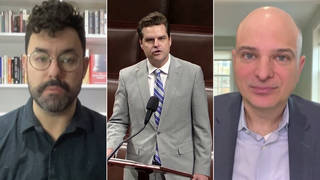
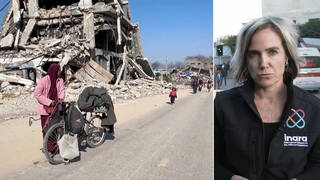
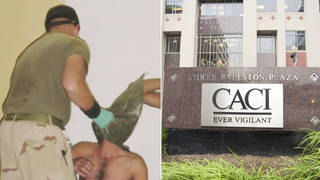
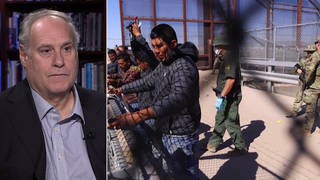





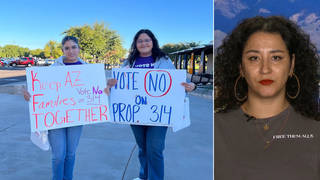
Media Options